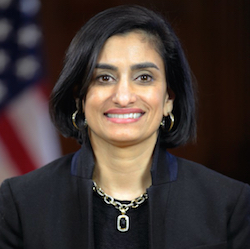
Provider groups told McKnight’s Senior Living that they are encouraged by the Medicaid vision and policies outlined Tuesday by Seema Verma, administrator of the Centers for Medicare & Medicaid Services.
The policies, which Verma shared during a plenary session at the National Association of Medicaid Directors Fall Conference in Arlington, VA, are meant to “encourage states to propose innovative Medicaid reforms, reduce federal regulatory burdens, increase efficiency and promote transparency and accountability,” CMS said.
“Our vision for the future of Medicaid is to reset the federal-state relationship and restore the partnership, while at the same time modernizing the program to deliver better outcomes for the people we serve,” Verma told meeting attendees, according to CMS.
Specifically, CMS said, the new policies are designed to streamline and improve processes related to Section 1915 waivers, Section 1115 demonstration projects and state plan amendments. Efforts related to 1915 waivers and state plan amendments will be expedited through a streamlined process and by participation in a new “within 15 day” initial review call with CMS officials, the agency said.
Waivers and demonstration projects that are less complex and have been operating smoothly will require much less reporting, CMS said, and waivers and demonstration projects that have a good track record of producing positive results will find an easier path to renewal.
Verma expressed a openness to states requiring work, volunteering, school or training for Medicaid beneficiaries of working age. Regarding other recipients, however, she said, “For those unable to care for themselves, we will create sustainable programs that will always be there to provide the care you need, to provide choices and allow you to live as independently as possible.”
“These new policies are encouraging, positive steps,” Lilly Hummel, senior director of policy and program integrity at the American Health Care Association/National Center for Assisted Living, told McKnight’s Senior Living. “NCAL is glad to see CMS focusing on reducing regulatory burden and increasing efficiency, especially when it comes to Medicaid waivers. Assisted living is a critical home- and community-based setting, and the demand for these long-term services and supports will only grow. States need support from the federal government to ensure their Medicaid HCBS programs can meet the needs of their vulnerable populations, and it appears CMS is offering that support.”
Peter Notarstefano, director of HCBS at LeadingAge, noted that the 1115 and 1915 programs already had some flexibility. “The main change is Seema Verma’s vision for a more collaborative approach for CMS to work with states as well as providers of home- and community-based services to implement innovative practices in Medicaid in an efficient and timely manner,” he said.
An Argentum spokeswoman said the organization was still reviewing the announcement.
To view the State Plan Amendment and 1915 Waiver Informational Bulletin, click here.



